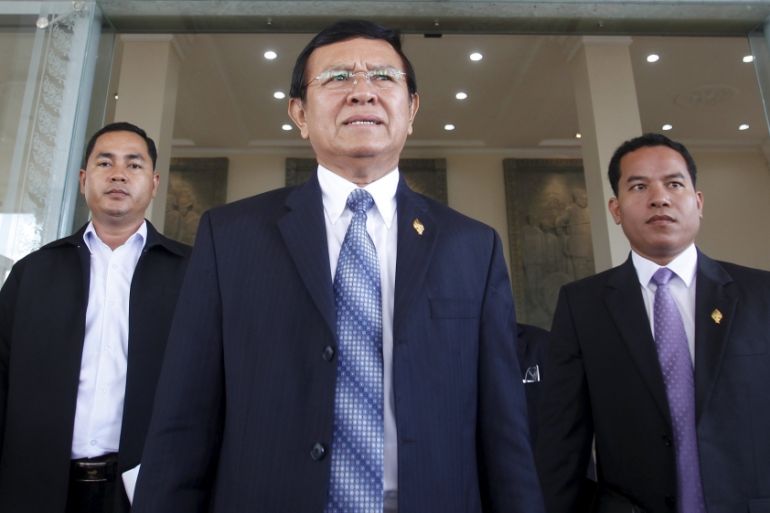Cambodia vote revives political tensions
Kem Sokha, deputy opposition leader, removed from parliament, just days after assault on two of his party colleagues.

Phnom Penh, Cambodia – Cambodia’s deputy opposition leader has been voted out of parliament in a move that is on shaky legal grounds.
Kem Sokha’s removal on Friday potentially shatters the “culture of dialogue” that has supposedly developed between the country’s two main political parties, which are headed by bitter rivals, Sam Rainsy and Hun Sen, the Cambodian prime minister.
Sokha’s party, the Cambodia National Rescue Party (CNRP), boycotted the vote. So it was left to the 68 members of Hun Sen’s ruling Cambodian People’s Party (CPP) to cast the ballot.
The Cambodian constitution allows for the removal of the National Assembly vice chairman – that is, Sohka – only in the event of illness, death or resignation.
But CPP legislators argue that they are within their rights to remove him, according to a report in the Cambodia Daily.
Because the CPP supported Sokha’s ascension to vice president, they claim that they now have the right to remove him.
Chheang Vun, the National Assembly spokesperson, said he had “no time” to comment.
Assault on colleagues
Sokha’s appointment had come as part of a frantically negotiated peace following the 2013 election which the CPP narrowly won amid mass accusations of cheating.
Friday’s vote came just days after two of his party colleagues were dragged from their cars and beaten during a rally demanding Sokha’s resignation.
Nhay Chamroeun and Kong Saphea were left severely injured in that attack.
It was the first in a series of intimidating incidents leading up to Friday’s vote.
In a post on his Facebook page, Sokha claimed gangs hurled stones at his house, terrifying his wife while he was in Thailand visiting the injured legislators.
Photos also emerged this week of a military rally where soldiers held placards emblazoned with slogans like, “Kem Sokha is a bad person who creates never-ending problems” and “Please remove him from the assembly”, according to a report in the Cambodia Daily.
Sam Rainsy released a statement following Monday’s attacks, saying that Hun Sen can “only resort to fascist tactics to remain in power”.
He also said that Hun Sen was “infuriated” by the anti-government protest he led in Paris last Sunday.
Apology sought
Hun Sen demanded an apology via a party spokesman on Thursday. He said the “culture of dialogue” between the two parties could be over if one was not forthcoming.
“The so-called culture of dialogue was dead a long time ago,” Virak Ou, analyst and founder of the Future Forum think-tank, told Al Jazeera.
“This is part of a wider move by Hun Sen to put pressure on the opposition; it’s part of a longer spell of abuse and violence designed to terrorise the opposition.”
Despite repeated attempts, no CPP spokesman was prepared to comment.
Hun Sen threatened Rainsy with legal action in a speech also made in Paris last Sunday, making it dangerous for Sam Rainsy to even return to Cambodia.
Pressure on the opposition is running high, and many fear this may signal a return to the violent politics of Cambodia’s bloody past.
Follow Nathan on Twitter: @NathanWrites